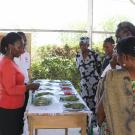Success story: Postharvest Training and Services Center
Reducing food losses through postharvest training
Once harvested, 30-80 percent of fruits and vegetables in Sub-Saharan Africa are lost to poor handling. Food quality, safety and nutritional value are also affected by poor postharvest practices.
In an effort to improve postharvest handling of horticultural crops, Feed the Future partners opened a model postharvest center in Tanzania and deployed newly trained experts from seven countries to train farmers.
In October 2012, 36 professionals from Tanzania, Rwanda, Kenya, Uganda, Ethiopia, Ghana, and Benin completed a year-long training in postharvest practices, led by an international team under the Feed the Future Innovation Lab for Collaborative Research on Horticulture.
Through online learning and mentoring, the trainer candidates each completed a series of 10 assignments ranging from assessing commodity systems to developing training programs. The trainings were led by Lisa Kitinoja of the World Food Logistics Organization, with Diane Barrett of the University of California, Davis, and additional training support from the University of Georgia, AVRDC-The World Vegetable Center, Amity University, UC Davis, and the Postharvest Education Foundation.
These 36 new postharvest trainers became the first graduates of the new Horticulture Innovation Lab Postharvest Training and Services Center, located at AVRDC-The World Vegetable Center in Arusha, Tanzania. The trainers learned about a variety of postharvest technologies, including the use of shade, harvesting tools, packaging, containers, grading, washing, cooling technologies, drying, and processing. They learned how to use various tools, including sizing rings, color charts, chlorine test strips, and refractometers, to measure postharvest quality.
Then new trainers officially opened the center by leading more than 100 local farmers through a day of postharvest instruction and demonstrations. Upon graduating, each of the trainers received a postharvest toolkit to help them get started with their next task—training farmers in their own countries. Ultimately, they are tasked with opening up their own postharvest training and service centers, each offering training, research, equipment retail and fee-based services.
In 12 months following their graduation, the 36 trainers have directly trained 7,474 farmers in postharvest practices and technologies across seven countries, with a potential multiplier effect of an additional 8,900 practitioners.
Designs for more than 80 additional Postharvest Training and Services Centers—including suitable sites, partners and costs—have been developed by trainers who took the year-long course.
Experts affiliated with the Horticulture Innovation Lab also continued to offer training through the center in Arusha for small-scale growers, marketers and processors. Over a two-year period that included the train-the-trainers, more than 16,000 farmers were trained in improved postharvest practices through this project.
“Many of our new ‘postharvest specialists’ are already working together on postharvest research projects or writing new proposals for training programs,” Kitinoja said. “Others have been hired for consulting assignments in the region or awarded fellowships that will allow them to continue their postharvest studies and/or extension work in their own countries.”
- February 2014

